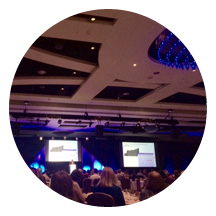The Future of the Health Care Marketplace: Implications for HR Leaders
![]() Print this Article | Send to Colleague
Print this Article | Send to Colleague

Monday’s Motivational Breakfast with Ian Morrison, PhD
Sponsored by Transamerica Retirement Solutions
Yesterday morning, Ian Morrison, PhD, presented his comprehensive view on the future of health care delivery in America and how this affects
HR leaders. Covering topics from health care costs and delivery, to our aging population, health insurers and consolidation, his entertaining and informational presentation proved to be a well-rounded outlook of what to expect in the future of
health care delivery.
Here were his top implications for
health care HR leaders.
Improvement Fatigue
HR leaders must address talent recruitment, retention and development, and the concept of ‘Improvement Fatigue.’ We’ve been talking about health care quality improvement for so long that our messages may be falling on deaf ears, and the relentless layering of quality initiatives can be overwhelming to frontline clinicians. "People need to understand why things are changing in a way that’s relevant to them," Morrison said. "In my view, clinicians are getting mixed signals."
Morrison shared four ways to overcome Improvement Fatigue:
- Tell a consistent, coherent story regarding improvement and initiatives.
- Rethink physician leadership.
- Provide institutional support (reference the Keystone Project), and get the tools for transformation in their hands.
- Emphasize the noble purpose of the work, and get down to why your people chose to be in the health care field.

Understand Population Health
Population level analytics reveal what Morrison calls the 5/50 Problem. "What we’re seeing is more and more institutions adopting a population health perspective," he said. When you start thinking like an insurer, you realize that about 5 percent of patients make up 50 percent of health care costs, 1 percent account for 20 percent of costs, and the bottom 50 percent of patients account for only 2 percent. "For a lot of these heavy health care system users, solutions look more like social work vs. health care," he concluded.
Embrace and Facilitate Change
Morrison emphasized that we have to drive change on a massive scale and that it’s not an easy task. In order to get organizationally and individually fit for
change , we have to understand why we’re changing and translate that into bite-sized chunks for our frontline employees. To do this, we have to understand how our initiatives affect what they do and why they do it. "Focus on systems, teams and flexibility," Morrison said. "Not silos, boundaries and rules."
Morrison closed by noting his optimism for the future of health care because of people’s adaptability and eagerness to roll up their sleeves to make it work. "I think we’ll end up having the best health system in the world because of the work that you’re doing," he said.
To learn more, read Health Care in the New Millennium: Vision,
Values and Leadership, by Ian Morrison available here.

